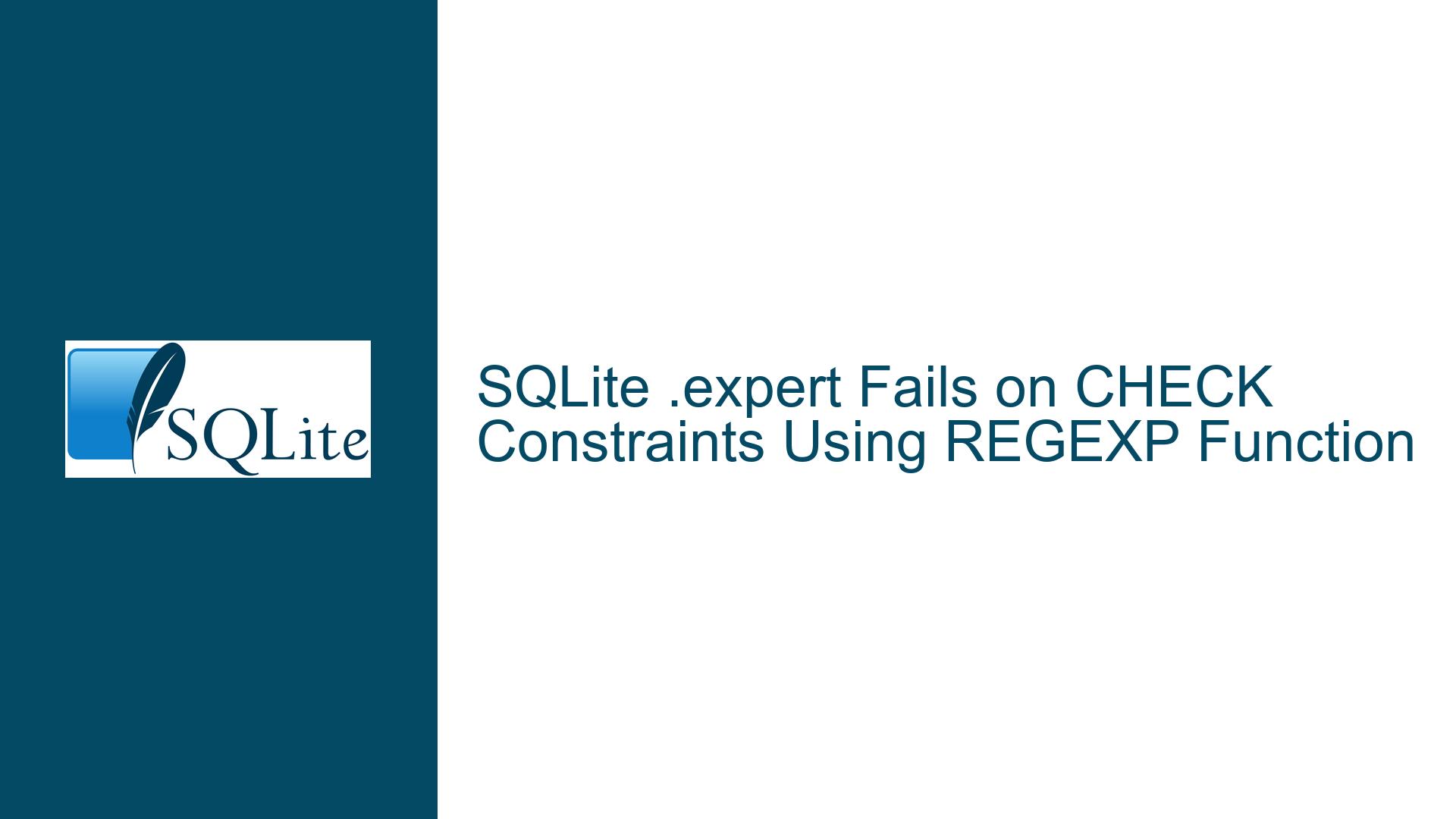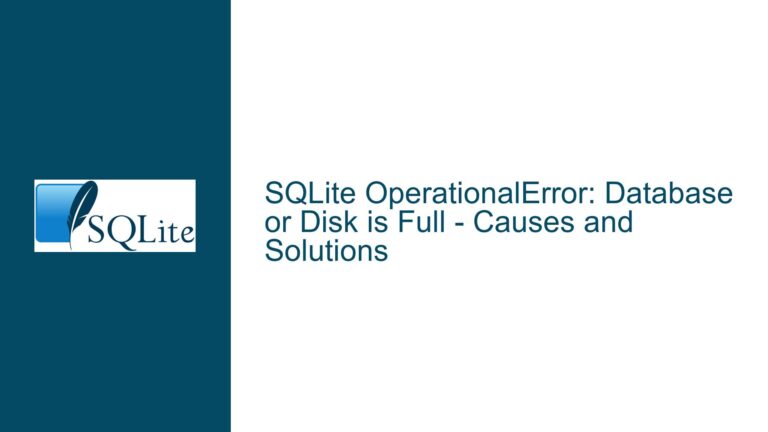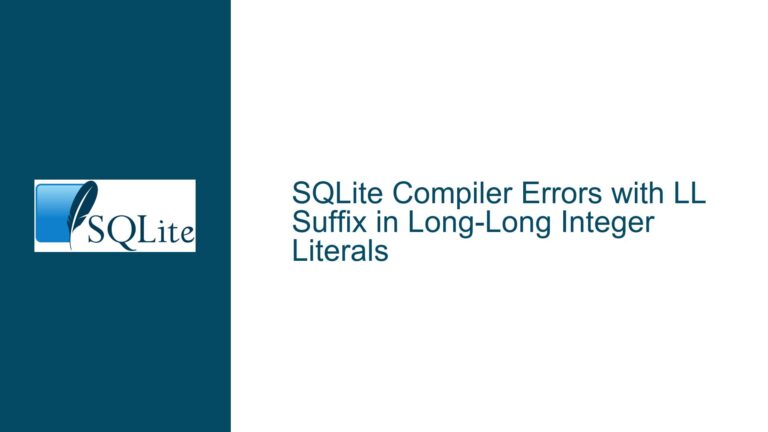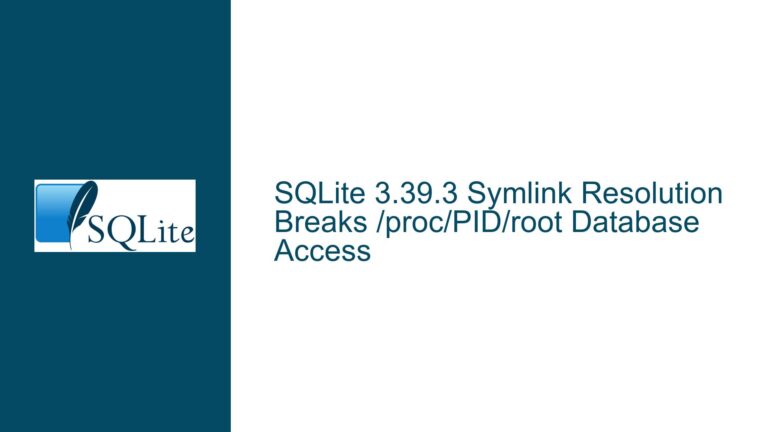SQLite .expert Fails on CHECK Constraints Using REGEXP Function
Issue Overview: .expert Fails with "no such function: REGEXP" During Schema Analysis
The SQLite command-line shell’s .expert utility is designed to analyze queries and suggest optimal indexes to improve query performance. However, when a table definition includes a CHECK constraint that references the REGEXP function, .expert fails with the error sqlite3_expert_new: no such function: REGEXP. This occurs regardless of whether the REGEXP function is provided via the built-in mechanism (e.g., a user-defined function) or an extension such as the PCRE module loaded via .load.
The problem arises during .expert’s schema analysis phase. When .expert processes the table definitions, it parses all constraints, including CHECK clauses. If a constraint references a function not registered in the SQLite session where .expert operates, the parser throws an error, halting further analysis. This prevents .expert from generating index recommendations, even for queries unrelated to the problematic CHECK constraint.
For example, consider a table foo defined as:
CREATE TABLE "foo" (
"id" INTEGER NOT NULL PRIMARY KEY,
"value" TEXT NOT NULL CHECK("value" REGEXP '^[a-z]+$')
);
Running .expert after creating this table results in:
sqlite3_expert_new: no such function: REGEXP
If the CHECK constraint is removed, .expert functions correctly. For instance, after removing the constraint, executing a query like SELECT "id" FROM "foo" WHERE "value" IN ('a', 'bcd'); would yield index suggestions. The issue is isolated to .expert’s inability to resolve the REGEXP function during its internal schema validation, not the validity of the CHECK constraint itself.
Possible Causes: Why .expert Cannot Resolve the REGEXP Function
1. REGEXP Is Not a Built-in SQLite Function
SQLite does not include a native REGEXP function. The REGEXP operator is syntactic sugar that maps to a user-defined function or an extension. By default, SQLite treats X REGEXP Y as regexp(Y, X), but the regexp function must be explicitly registered. If this registration does not occur in the session where .expert operates, the function is unrecognized, causing schema parsing to fail.
2. .expert Operates in a Separate Session or Environment
The .expert utility likely initializes a new SQLite database connection or session to analyze schemas and queries. Extensions or user-defined functions loaded in the parent shell session (e.g., via .load pcre) are not automatically inherited by this new session. Consequently, even if the REGEXP function is available in the main shell, .expert’s internal session lacks access to it, leading to the "no such function" error.
3. Schema Validation Precedes Query Analysis
.expert first validates the entire schema before analyzing specific queries. This validation includes parsing all table definitions and constraints. If any constraint references an undefined function (e.g., REGEXP), validation fails immediately, preventing further analysis. This design prioritizes schema integrity but creates a dependency on all referenced functions being available, even if they are irrelevant to the target query.
4. Extension Loading Mechanisms Are Session-Specific
Extensions like the PCRE module are loaded per-connection. When .expert initializes its session, it does not automatically load extensions that were loaded in the parent shell. This limitation means that REGEXP functions provided by extensions are unavailable unless explicitly loaded in .expert’s session—a process not exposed to the user.
Troubleshooting Steps, Solutions & Fixes: Resolving REGEXP Dependency in .expert
Step 1: Confirm REGEXP Function Availability in the Default Session
Before troubleshooting .expert, verify that the REGEXP function is correctly registered in the primary SQLite session. Execute a test query that uses REGEXP:
SELECT 'abc' REGEXP '^[a-z]+$';
If this returns an error (no such function: REGEXP), the function is not registered. To register it:
- For the default regexp() implementation (case-sensitive, limited to
LIKEsyntax):SELECT load_extension('your_sqlite_path/libsqlite3_regex.so'); -- Linux SELECT load_extension('your_sqlite_path/sqlite3_regex.dll'); -- Windows - For the PCRE extension:
.load /path/to/pcre
If the test query succeeds, proceed to Step 2.
Step 2: Bypass .expert’s Session Isolation
Since .expert uses a separate session, manually replicate its functionality while ensuring REGEXP is available. This involves:
- Create a New Database Connection with REGEXP
UseATTACH DATABASEto create a temporary database whereREGEXPis registered:ATTACH ':memory:' AS expert_db; -- Load REGEXP extension in the attached database SELECT load_extension('pcre', 'expert_db'); - Manually Analyze Queries Using EXPLAIN QUERY PLAN
For the target query, generate an execution plan to infer missing indexes:EXPLAIN QUERY PLAN SELECT "id" FROM "foo" WHERE "value" IN ('a', 'bcd');If the output includes
SCAN TABLE foo, an index onvalueis likely beneficial.
Step 3: Modify the Schema to Avoid REGEXP in CHECK Constraints
If .expert is essential and REGEXP cannot be omitted, refactor the schema:
Replace CHECK Constraints with Triggers
Convert theCHECKconstraint into aBEFORE INSERTorBEFORE UPDATEtrigger:CREATE TRIGGER validate_foo_value BEFORE INSERT ON foo BEGIN SELECT RAISE(ABORT, 'Invalid value') WHERE NEW.value NOT REGEXP '^[a-z]+$'; END;Triggers are not parsed during
.expert’s schema validation, avoiding theREGEXPdependency.Use a Custom Validation Function
ReplaceREGEXPwith a SQLite-compatible function, such asLIKEorGLOB, if the pattern allows:CHECK("value" GLOB '[a-z]*') -- Inexact but avoids REGEXP
Step 4: Feature Request: Enhance .expert to Handle Extension-Dependent Schemas
If the above workarounds are impractical, consider advocating for a SQLite enhancement:
Formal Feature Request
Submit a request to the SQLite team to:- Allow
.expertto inherit extensions loaded in the parent session. - Add an option to skip constraint validation during schema analysis.
- Allow
Community Workarounds
Engage the SQLite community to develop a patched version of.expertthat handles extension dependencies gracefully.
Step 5: Use Alternative Index Suggestion Tools
If .expert remains unusable, employ third-party tools or scripts to analyze queries:
- EXPLAIN QUERY PLAN: Manually interpret execution plans.
- SQLite Tuning Tools: Use tools like
sqlite_analyzerorsqlean(third-party extensions) for index recommendations.
Final Solution Summary
The root cause of .expert’s failure is its inability to access the REGEXP function in its isolated session. To resolve this:
- Short-Term Fix: Remove
REGEXPfromCHECKconstraints or replace it with triggers. - Long-Term Fix: Advocate for
.expertenhancements to handle extension-dependent schemas. - Alternatives: Use manual query analysis or third-party tools for index suggestions.
By addressing the session isolation and schema dependency issues, users can leverage .expert effectively while maintaining data integrity through alternative validation mechanisms.






